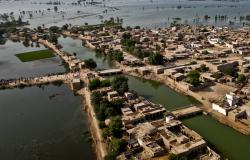Floods in Pakistan and the Synthesis of Glocal Voices on Climate Justice

Shafiq Ahmad Kamboh and Muhammad Ittefaq have shed light on the announcement of the proposed loss and damage fund, arguing it a monumental achievement for climate activists and vulnerable countries' leadership in paving the path to climate justice.
Several factors have contributed to the formation of this fund, but the global voices on climate justice that were raised in the backdrop of Pakistan’s Summer 2022 floods played a crucial role. The injustice was initially highlighted by foreign political, social, and scientific communities, which helped break the self-imposed spiral of silence by the local Pakistani leadership. When global voices aligned with local voices, a powerful resonance effect was generated that eventually motivated activists to call for paying damages to vulnerable countries like Pakistan.
The United Nations Climate Change Conference COP27 will be remembered in history for successfully reaching a breakthrough agreement to form a loss and damage fund. This fund will require countries responsible for high GHG emissions to compensate vulnerable countries suffering from climate change. Some experts believe that “the loss and damage fund is a response to climate injustice and climate debt owed by rich countries to the poor”. While some analysts’ give credit to international civil society pressure for organizing powerful protests advocating climate justice within the negotiating zone, others believe in the effective advocacy and diplomacy efforts displayed by the Pakistani delegation at COP27. For instance, Lakhani (2022) assumes that digital media activists, grassroots leaders, and climate justice advocates from the US and EU also played an important role in putting pressure on international leaders, making it difficult for them to walk away. Although all these factors contributed to the formation of this fund, the glocal voices on climate justice raised in the aftermath of Pakistan’s Summer 2022 floods played a crucial role.
An erratic monsoon followed by flooding is not a new occurrence in Pakistan. However, during the two recent massive floods of 2010 and 2014, record-breaking rains affected almost the entire country, resulting in the loss of thousands of lives, and the destruction of millions of acres of arable land and homes. Despite a few voices associating these flooding events with climate change, burden-sharing justice debates and the polluter pays principle were not adequately incorporated into journalistic write-ups. Furthermore, even environmental scientists did not link these floods directly to climate change, making it impossible to recommend the formation of a compensation fund for affected countries.
In early September 2022, Pakistan was once again hit hard by flooding due to unprecedented heavy monsoon rains, which were the worst in the country's history. Approximately 33 million people were affected, with over 1700 deaths and the destruction of around two million houses. However, this time, right from the beginning, global opinion leaders, including social and political dignitaries, civil society activists, advocate journalists, social justice campaigners, and scientists, reignited the debate on climate justice and stressed the need for compensation for the damage caused by climate change-induced floods.
Synthesis of glocal voices on climate justice
For instance, Jemima Goldsmith, a British filmmaker and former wife of Pakistani Prime Minister Imran Khan, expressed her views on Twitter.
(prayers) for the 33 million in Pakistan affected by the devastating floods. 1000+ killed. 200K+ homes destroyed. Pakistan produces less than 1% of global carbon emissions.
But it’s one of the top 10 countries most affected by the climate crisis. A few days later, Antonino Guterres, the UN Secretary General, visited Pakistan and while calling for the international support tweeted:
Discussed with PM @CMShehbaz Pakistan's response to devastating floods. Pakistan suffers—yet has done almost nothing to contribute to climate change. I urge countries to generously support the humanitarian response, recovery & reconstruction as a matter of solidarity & justice (Sep. 9, 2022).
During a media talk, he emphasized that Pakistan required significant financial support to address this crisis, emphasizing that this was not a matter of generosity, but rather justice. Angelina Jolie, a Hollywood actress and the then UNHCR Goodwill Ambassador, also visited flood-ravaged areas in Pakistan and stated:
“I've never seen anything like this. … I am overwhelmed… I think this is a real wake-up call to the world about where we are at, and that climate change is not only real and it's not only coming, but also very much here… If enough aid doesn't come, they (children) won't be here in the next few weeks” (Gul, 2022).
During his address to the 77th session of the United Nations General Assembly, US President Joe Biden called on the international community to support Pakistan, which was heavily affected by flooding. Biden stated, “We all know we’re already living in a climate crisis. No one seems to doubt it after this past year. As we meet, much of Pakistan is still underwater; it needs help”. Even the global scientific community was not silent on the matter. In analyzing the causes of the 2022 floods, Mallapaty (2022) reported:
“Human-induced global warming could also be intensifying downpours. Climate models suggest that a warmer world will contribute to more intense rainfall, says Hussain. Between 1986 and 2015, temperatures in Pakistan rose by 0.3 °C per decade — higher than the global average.”
In an article entitled Pakistan's Floods: A Result of Climate Injustice Waqas (2022) made the following recommendations:
Politicians, scientists, and the United Nations have spoken out against climate injustice in Pakistan, which relies on foreign grants for climate mitigation and adaptation. A global framework must be established to prevent developing countries such as Pakistan from becoming ground zero of climate change.
These statements of support from the international social, political, and scientific communities have helped Pakistani political leaders recognize the prevailing opinion on climate change, which has eventually led them to acknowledge the current floods as climate change-induced and speak out against the climate injustice faced by local residents. We argue that the tweets, media talks, and scientific publications by foreign political, social, and scientific figures (some of whom are mentioned above) served as a catalyst in breaking the self-imposed silence of Pakistani political leaders who were initially hesitant to link the recent floods to climate change and engage in climate justice debates. According to Anees (2022), the advocacy around climate justice is a new phenomenon in Pakistan, stating that “it is only after the recent floods that politicians, the media, and activists have collectively spoken out against climate injustice”.
Proposed by the German sociologist Noelle-Neumann, the spiral of silence theory (1974) suggests that on controversial issues, individuals make decisions based on the prevailing opinion. If they believe that their opinion is in the minority, they may choose not to express it openly due to the fear of isolation. This reluctance to speak out results in their views being ignored. The willingness to express oneself is heavily influenced by the distribution of public opinion. Those who perceive that their opinions will be met with approval are more likely to express themselves without hesitation and sometimes even vehemently.
Therefore, after meeting with the UN Secretary General, the country's Prime Minister, Shahbaz Sharif, tweeted:
Had a very productive meeting with UN Secretary General @antonioguterres earlier today. He has shown empathetic leadership to highlight sufferings of the flood victims. The international community should come forward to help Pakistan that is undergoing horrors of climate change (Sep. 9, 2022).
A few days after Jemima Goldsmith's tweet, Pakistan's Federal Minister for Climate Change, Sherry Rehman, emphasized the importance of burden-sharing justice in a tweet:
It is about the Global North not adhering to the pledges they have made. Heatwaves trigger most of our catastrophes that have deemed us the ground zero of the climate crisis. We must ask why more is not done to help a country that is so disproportionately affected (Sep. 6, 2022).
Later, in a TV interview in Germany, Pakistan’s foreign minister, Bilawal Bhutto said:
“It's a question of justice that a country that produces 0.8% of the global carbon footprint is the eighth most climate stressed country on the planet. Some 33 million people are paying with their lives and their livelihoods for the industrialization of richer countries," he said, underlining that "this is a global problem demanding global actions" (Shams, 2022, para. 14).
The analysis of supporting comments on climate justice by the international community suggests that effective glocal opinion leaders were able to synthesize global and local voices on Pakistan's recent floods, creating a strong resonance effect around climate justice debates. This effect fortified other relevant global climate actors, including advocacy groups, journalists, and civil society activists, to call for paying damages to vulnerable countries. In addition, it helped Pakistani delegates at COP27 to have a clear mind and a firm resolve. This resolve was evident in the words of Sherry Rehman, who, in an interview leading up to the conference, insisted:
“We are on the frontline and intend to keep loss and damage and adapting to climate catastrophes at the core of our arguments and negotiations. There will be no moving away from that” (Lakhani, 2022).
The announcement of the proposed loss and damage fund is a significant achievement for climate activists and vulnerable countries' leadership. However, it is just the beginning of a long journey. Many questions still need answering, such as who will contribute to the fund, how the funding will be distributed, and who will benefit from it. Despite these uncertainties, this fund is a crucial starting point. As a major victim of climate injustice, Pakistan needs to strongly advocate for the Resilient Recovery, Rehabilitation, and Reconstruction Framework (4RF) at all upcoming international forums (UNDP, 2022). This advocacy will help to assess the extent of rich countries' cooperation and ensure that Pakistan receives the support it needs.
Dr. Shafiq Ahmad Kamboh (Ph.D., Bremen University, Germany) is an Assistant Professor in the School of Communication Studies, University of the Punjab, Lahore, Pakistan. His research has been published in a wide range of academic journals, including International Journal of Communication, Psychology & Health, Third World Quarterly, Local Environment, Analyses of Social Issues and Public Policy, and Development Policy Revie.
Twitter: @ShafiqAKamboh
Dr. Muhammad Ittefaq (Ph.D., University of Kansas, United States) is an Assistant Professor in the School of Communication Studies at James Madison University, Harrisonburg, United States. His research explores how individuals consume and engage with health and climate change information, including misinformation and disinformation. His research has been published in a wide range of academic journals, including Journalism: Theory, Practice & Criticism, Journalism Practice, International Journal of Communication, Journal of Health Communication, Journal of Science Communication, Convergence: The International Journal of Research into New Media Technologies, Vaccine, Digital Health, Health, Risk & Society, Psychology & Health, Third World Quarterly, Local Environment, and Analyses of Social Issues and Public Policy.
Website: https://muhammadittefaq.com/
Twitter: @IttefaqM
Image: DVIDSHUB via Flickr (CC BY 2.0)


